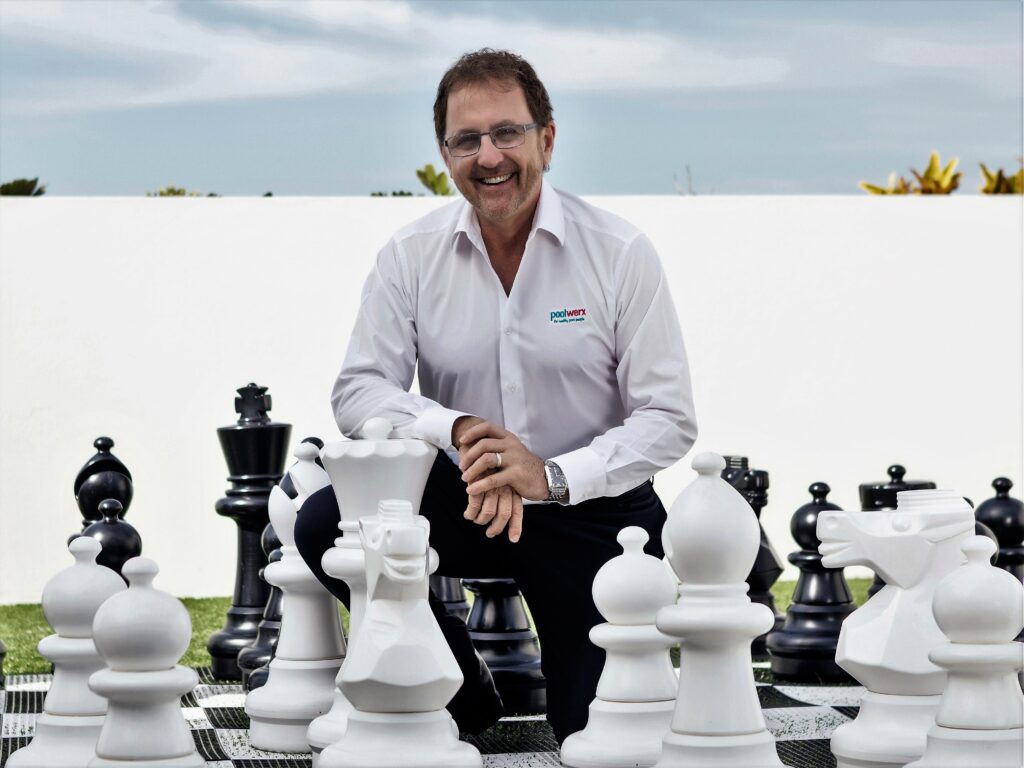
How John O’Brien stopped sweating the small stuff and turned Poolwerx into a $100m+ operation.
Today’s Poolwerx network with more than 100-stores started 25 years ago with a smattering of mobile vans and franchisees servicing household pools
Now there are nearly 500 mobile service units franchised in Australia and New Zealand, and the brand has a sizeable foothold in the US. Inside Franchise Business asked founder and CEO John O’Brien to share some key learnings during his quarter century at the helm.
“If there was a pivotal moment – as in one big breakthrough – I can’t put my finger on it. The closest I can get is a realisation about five years ago that I had lost obsessive interest in the small stuff. I guess this happens when at last you have the wherewithal to get senior people around you who are strong thinkers and decision-makers.
“There are still going to be glitches, but little things that might have upset me a while back no longer do and this has given me freedom to focus on the larger game. So perhaps I can offer a few thoughts around that.”
Staying ahead of the competition as a franchisor
In our industry we’re number three in the world, which is a reasonable sort of achievement, but it also tells you how disorganised our particular niche is. We’ve disrupted it by bringing organisation and systemisation to chaos but it would be nave to think that’s going to last forever.
Yes it’s fine to aspire to being number one but the vastly bigger question is: number one of what? Will the ‘what’ you’re so focused on today still be relevant in the market of a few years time? We’re thinking 10 years ahead –knowing full well that our wildest imaginings nowarelikely to be old hat by then. No matter. It’s about being alert, open to change, and sufficiently agile to leverage it as and when it comes.
Turning a franchise into benevolent partnerships
We have franchise partners, not franchisees. It’s not just a buzzword. I think we’ve reached a level of maturity where it’s meaningful.
The Franchise Relationship Institute’s Greg Nathan says success in anyfranchised business is 60 per cent down to the franchisor, and 40 per cent franchise partner guts and determination. So we’re all clearly accountable and if the ball gets dropped we mutually agree a remedy and move ahead.
Never is a derogatory word said about a franchise partner in our business; there’s no profit in blame. And that sense of partnership extends to our suppliers as well – our Partners in Profit.
I learned long ago that profitable partnerships have nothing to do with screwing the other guy to the wall. We want our suppliers to do well out of us and inevitably, the better they do, the better the deal.
Structuring the franchise management style
In my younger corporate years I often found myself in meetings with people twice my age and always seemed to be the one asking uncomfortable questions and challenging bullshit. Oddly, no one shot me for it.
Then, during my early years in franchising I think many people found it hard to reconcile the affable larrikin with the sometimes-prickly CEO. But around 15-years ago I started to find a balance.
These days I’m very big on having structure in how our team leaders are managed and manage others. We sit down and agree what we’re going to achieve for the year and set some rules and then we’re accountable to that, with me as mentor.
There’s a monthly contact week when we have all our key interaction and we never have a meeting unless there’s a clear purpose and expectation of outcomes. It seems to be a very time efficient and respectful way of doing things.
Sure, there are responsibilities, duties and deadlines but it introduces a logical structure and certainty that seems to make it possible to be both manager and mate.
Sticking with the franchise
I’m often asked when I am going to stop and smell the roses. Truth be known, I am doing that right here and now. I have spent 30-years gathering all this knowledge and experience and am lucky enough to be young enough that doing what I’m doing in this moment amounts to the best time of my life.
We’re approaching 150-stores in three countries and it can so easily become a thousand. It’s a matter of my remaining involved at the right level – encouraging new leaders to rise through the system, while providing a steadying influence.
I’ve seen great franchise systems fall apart when the founder severs ties too soon and the vision becomes compromised. So here are four tips for maintaining that vision:
- Be prepared for disruptive change and perpetually reinvent
- Cultivate benevolent, mutually profitable partnerships at every level
- Be clear in your (realistic) expectations of people, encouraging accountability in all
- Avoid obsession with the small stuff and stayfocused on the vision.

